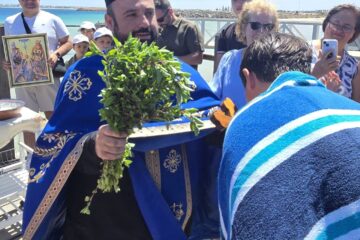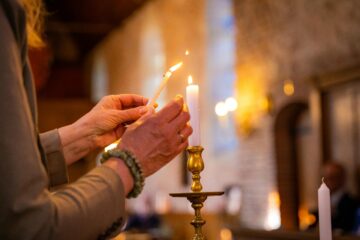Introduction
The political atmosphere in America today is characterized by deep divisions, cultural conflicts, and a myriad of challenges that require careful examination from an Orthodox Christian perspective.
It is important to start out with realistic expectations within the truth of the Gospels in order for our spiritual existence to take root on solid ground. As followers of Christ, Orthodox Christians are called to adhere to moral principles rooted in their faith while simultaneously engaging with the complexities of public life. Our world is changing but that doesn’t mean our faith is changing. One crucial understanding that arises from this perspective is the notion that we cannot expect to legislate morality in a way that guarantees moral behavior or a moral society.
The Nature of Moral Legislation
Morality, as understood within Orthodox Christianity, is a reflection of divine law and the teachings of Christ. It encompasses values such as love, compassion, justice, and humility, which are intended to guide not just individual behavior, but the broader fabric of society. While laws can indeed reflect moral values—prohibiting murder, theft, and other violations of human dignity—they cannot compel individuals to possess true moral character or genuinely love their neighbors.
Legislation often provides a framework for societal order and safety, but Orthodox Christians hold that laws alone cannot transform hearts. The struggle for a just society is not solely a matter of passing legislation; it is a deeper call for spiritual renewal and a commitment to living out one’s faith in practical ways. This understanding places a greater emphasis on moral persuasion, communal responsibility, and the role of the Church rather than mere legalism.
Historical Context of Morality and Legislation
Historically, the Orthodox Church has navigated complicated relationships with secular authorities. In various contexts, from the Byzantine Empire to modern nation-states, the Church has grappled with how to maintain its moral teachings while engaging with governmental structures. Rather than seeking to dominate or control the state, the Orthodox perspective emphasizes the autonomy of the Church and its prophetic voice in society. It baptizes the culture it encounters.
Moreover, the Church historically acts as a moral compass, advocating for justice and mercy, especially in relationships that involve power dynamics. This can be an is an exhausting process. Let’s not kid ourselves.
The understanding is that true moral authority comes not from legislative power, but from embodying the principles of Christ’s love and truth within society. This view fosters a kind of witness that transcends political affiliation, calling the faithful to engage in acts of service, reconciliation, and restorative justice.
Current Political Issues: Where Morality Meets Governance
1. Social Justice and Advocacy
One of the most pressing political issues today is the movement for social justice, encompassing various rights, including racial justice, economic equity, and protection for marginalized communities. Orthodox Christianity emphasizes the dignity of every person as created in the image of God, compelling believers to advocate for the oppressed and marginalized.
While efforts to codify social justice principles into law are valuable, Orthodox Christians recognize that laws alone do not create a just society. Genuine social change often requires a transformation of hearts and minds. The Church is called to lead by example in promoting equity and justice through community engagement, education, and advocacy. The moral imperative is clear: engage in the work of justice not just through political means but through acts of love and service.
2. Family, Marriage, and Sexual Ethics
Orthodox teachings uphold the sanctity of marriage and the family as foundational to society. In a time when family structures are under significant stress and redefinition, Orthodox Christians face moral and ethical dilemmas regarding issues like same-sex marriage, gender identity, and parenting practices.
While there is a strong emphasis on maintaining traditional views, Orthodox Christians cautioned against solely relying on legislation to uphold these values. Legislation can protect the institution of marriage, but it cannot cultivate genuine understanding and respect for the importance of family life. The Church’s role is one of pastoral care and guidance, encouraging families to embody the love of Christ through their relationships and to project a nurturing model of family life to the wider community.
3. The Sanctity of Life
Another area of moral concern is the sanctity of life, particularly concerning abortion and end-of-life issues. The Orthodox Church firmly upholds the belief that life is a gift from God, deserving respect and protection. However, the polarized nature of the abortion debate in America often leads to calls for stricter laws.
While Orthodox Christians are called to defend the sanctity of life, they must also acknowledge that simply passing laws against abortion does not address the root causes that lead individuals to consider such options. The Church’s response must involve compassion, education, and support for pregnant women, advocating for policies that provide healthcare, economic support, and better options for care and adoption.
4. Immigration and Refugee Crisis
The issue of immigration is another contentious topic in contemporary America. Guided by Scripture, Orthodox Christians recognize the call to welcome the stranger and support refugees. However, immigration policies often reflect political, economic, and security concerns that conflict with Christian values.
Legislation can protect borders, but it cannot engender love and acceptance toward those seeking refuge. The Orthodox Christian response involves not just advocacy for humane immigration policies but also a commitment to personal and communal engagement with immigrants and refugees. This means helping, companionship, and understanding, as well as advocating for respectful treatment. The moral call is to not only address policy but to cultivate a culture of hospitality informed by the teachings of Christ.
5. Environmental Stewardship
As the world grapples with climate change and ecological degradation, Orthodox Christianity emphasizes the importance of caring for creation. Creation is viewed as a divine gift, and humanity is seen as a steward of God’s handiwork. While legislation may aim to address environmental concerns, Orthodox Christians understand that true stewardship goes beyond law; it requires a transformation in the way individuals and societies relate to the natural world.
This perspective compels believers to adopt sustainable practices, promote awareness about environmental issues, and engage in active conservation efforts. The Church can lead initiatives that educate and encourage communities to appreciate their role as stewards of creation, advocating for policies that reflect a commitment to protecting the environment—not as a legal obligation, but as a moral imperative grounded in faith.
The Role of the Church in Political Discourse
In navigating these complex issues, the Orthodox Church has a vital role to play in framing political discourse. Recognizing that moral values cannot solely be legislated, the Church can foster open discussions about ethics, morality, and justice within society. This means providing a prophetic voice that challenges injustices while also offering hope, reconciliation, and practical solutions that embody Christ’s teachings. To be certain this can be a tight rope to navigate. Non the less the Church must lead and be proactive rather than reactive to everything happening in the world.
Orthodox Christians are called to engage with the world in ways that reflect the love of Christ, encouraging political leaders and citizens alike to pursue justice, compassion, and truth. This engagement requires humility, wisdom, and a willingness to listen—qualities that can often get lost in the heat of political debate.
1. A Call for Holistic Engagement
The Orthodox Christian perspective urges believers to participate in civic life holistically. This involves not only voting and advocating for policies aligned with their values but also living out those values in daily life. The embodiment of Christ’s message calls for Christians to be agents of change in their communities, moving beyond mere political action to genuine relationships.
By being involved in local charities, outreach programs, and community service, Orthodox Christians can demonstrate the transformative power of living one’s faith in public life. This holistic approach not only uplifts the moral standards of society but also fosters genuine connections among individuals with differing beliefs and backgrounds. This is why the local parish with its priests and lay leaders are so important. The Church is the place of transformation of the person and must be strengthened and encouraged in every way.
2. Building Bridges, Not Barriers
In a climate of political discord, Orthodox Christians can serve as mediators and bridge-builders. By emphasizing dialogue and understanding over division, they can create spaces where individuals can come together, share their stories, and work toward common goals. This approach aligns with the Orthodox commitment to reconciliation and community, reflecting a more profound understanding of human connection.
Engaging in interfaith activities and dialogues also plays a crucial role in these efforts. By collaborating with diverse faith communities on social issues, Orthodox Christians can demonstrate the universal message of love and compassion that transcends specific doctrinal divides. This collective action can serve to influence public policies and spark positive community change.
The Path Forward
The contemporary political landscape in America presents significant challenges and opportunities for Orthodox Christians. While the call to engage with the public square is clear, it is equally essential to recognize the limitations of legislative solutions for essentially moral issues. As followers of Christ, we must strive to live out our faith actively, embodying principles of love, justice, and mercy in all interactions.
As we navigate the complexities of modern society, the Orthodox Church must remain committed to being a voice for moral truths that transcend partisan politics. In doing so, believers can inspire others toward true change—not merely through laws but through hearts transformed by love and grace.
Ultimately, the challenge for Orthodox Christians lies in fostering an environment where genuine dialogue, compassion, and moral integrity can flourish. In cultivating such an environment, they will contribute to a richer, more humane political discourse that reflects the light of Christ in a world often shadowed by division and strife. Engaging deeply in the life of society, Orthodox Christians have the opportunity to not only influence legislation but to uplift the moral fabric of their communities, serving as a testament to the profound and transformative power of a faith lived out in love.
In pursuing this path, Orthodox Christians can align themselves with the greater call of Christ—to love their neighbors, to serve the least among them, and to work tirelessly for a society that reflects the justice, mercy, and peace of God. The journey may be challenging, but with faith as their guide, they can become agents of change, contributing to a more just and compassionate world.



0 Comments